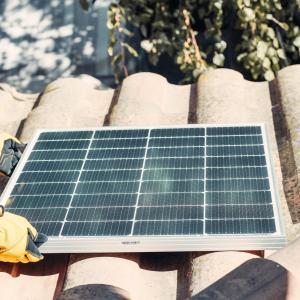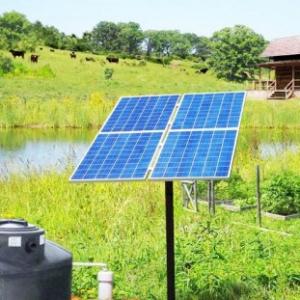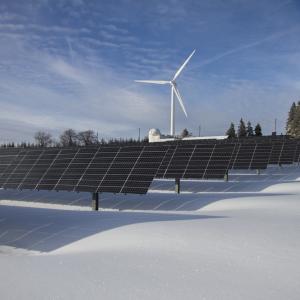Solar For Your RV
Solar panels are environmentally friendly! And they’re becoming more cost-efficient! They’re great for when you want to take your RV off-the-beaten path! You’re thinking about installing panels on your RV, but you’re not entirely sure whether or not it will be worth your while, or quite where to start; carry on, and we’ll figure out whether or not solar panels are right for you!Advantages of Solar
First, let’s look at the advantages of solar. As you already know, they’re an environmentally-conscious way of producing electricity. GIven the leave-no-trace philosophy of many RVers, solar probably aligns with your personal values; it’ll be impossible to enjoy nature if climate change gets so bad that there’s no nature to enjoy! Solar also gives you the freedom to bring your RV anywhere; no need to choose campsites that provide hookups for shoreline power, so you can go anywhere your heart desires! Solar is also relatively easy to install; once installed, maintenance is basically non-existent. Solar power generation is also extremely quiet, so you won’t have to worry about loud sounds keeping you awake or the wildlife away.
Types of RVing
When we think of RVing, we think of four different types. The first type is someone who lives in their vehicle full-time, in a trailer park. For these folks, solar is a way of reducing environmental impact, but not much else. You’re already paying for your shoreline connection, and it’s unlikely there’s a net-metering program in place with the campground. If you are able to sell power back to the grid, take advantage! Solar is also not usually great for people who don’t RV too often; the power you generate might be insufficient to pay back the cost of the panels, though it’s again a good option if the environment is your main concern. When you drive all day long, you might not need solar; the battery will store energy that’s been created by the engine during the long haul, and if you’re just driving in the day and sleeping at night you likely won’t need solar panel. The fourth and final type of RVer is the person who takes their RV to a secluded location and stays there; for this demographic, solar panels are incredible. They allow you to go places you could never have gone otherwise, and the extra energy production is essential when you’re not generating power by driving.
Having said all that, if you’re a bit of a boondocker, it’s likely solar is right for you. The next thing you’ll want to know about is how the solar system will work for you. You may already have some idea about how an RV’s internal power system works; you have a battery that’s storing electricity, to which power can be provided by your vehicle’s alternator or shoreline power; you may also have a gas power generator. Solar panels are added to this system and integrated into the whole, so they can provide power to your battery. You’ll need the panels themselves, which turn energy from the sun into electricity; you’ll also need a charge controller. Charge controllers prevent your battery from overcharging; variant charge controllers can also convert the solar electricity into the perfect voltage for your particular battery. These are known as Maximum Power Point Tracking (MPPT) controllers. You’ll need an inverter, to change solar’s DC power into the AC energy your battery craves; you’ll likely want to add more batteries, as well, to account for the increased capacity in energy production.
How much wattage do you need?
So how much wattage do you need your solar panels to provide? That’s a question that only you can answer, but a good way to start is by checking how much electricity your appliances consume, and how often you use them in a day. Figure out how many watts it takes to run your appliance for an hour, determine how many hours a day you use the appliance, and that tells you how many watt-hours/day that appliance requires. Then, you should determine how much electricity your other power sources are providing; if all you have is an alternator and solar panel, then on days when you’re not driving your panels will have to provide all the electricity, plus whatever is stored in the battery already. An 800 watt system might provide you with, on average, 4000 watts in a day; more than enough for most RVs.
Figuring out exactly how much energy production you need is best because unlike solar panels on homes, you can’t sell the electricity back to the grid. Batteries obviously can’t hold more than 100% of their maximum capacity, so anything you’re generating over that amount is simply wasted. That’s why it can be prudent to add more batteries to your array if you suspect you’ll be generating more power than your current battery can take. The batteries you use to supplement your old one can be of a variety of types; more expensive batteries typically last much longer, so if you know you’ll be RVing all the time and don’t want to replace the battery every couple of years, it may be prudent to avoid lead-acid batteries. With a high-capacity battery and a good solar array, you can charge enough energy to survive 3 or 4 days without the sun.
You should avoid running air conditioning in your RV; no amount of solar is going to save you, because a sufficiently large array would be too big to fit on top of most RVs. If you’re not sure how much solar you need, start small with a few panels; you can always add more if you feel more generation is to your advantage. Solar panel kits for RVs are DIY and modular; it’s easy to add a few extra batteries or panels, and you can adjust your panels so that they’re always facing the sun for maximum power generation. Solar is becoming much more affordable, and there are many different setups for all types of energy use; experiment, find what works best for you, and enjoy your solar life!






